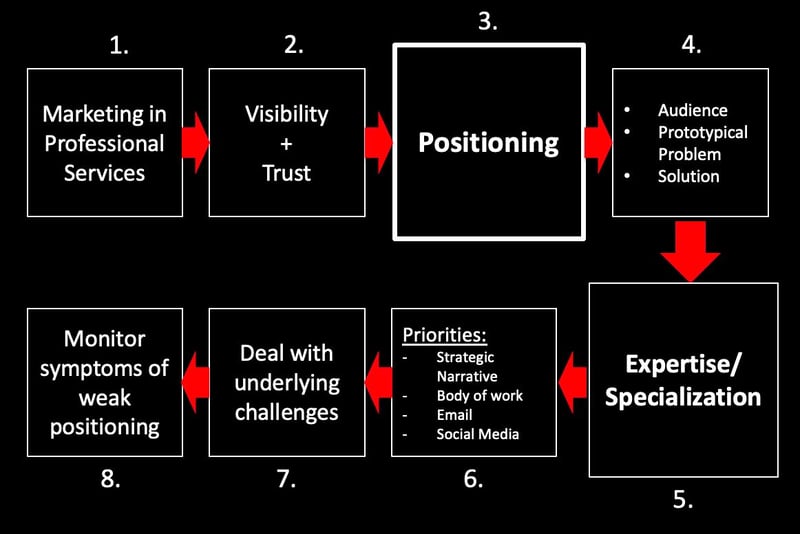
A Consultancy's Positioning Has the Single Biggest Impact on the Buying Decision
.jpg?width=56&name=francescorizzato8%20(1280px).jpg)
This article was last updated on 18 October 2022.
I often ask consultancies: "If someone asks your past client what you, as a consultancy, do, what would be the answer? Will your client be able to say without hesitating or having to think for more than five seconds what your firm brings to the table? Will their answer encourage others to hire you?"
Let’s talk about positioning. More specifically, today, I’d like to explain why every consultancy must regularly audit their positioning, why positioning matters, and how to conduct a self-assessment.
What is positioning?
Let’s start with the basics – defining positioning.
Positioning is a company's place within a marketplace. It’s a statement, the way it is perceived on the market, and the parameters the consultancy sets for their own work and engagement with clients.
A strong positioning statement follows the following structure: XYZ
- X = the target audience
- Y = the impact/output as a consultancy
- Z = the approach to producing that output
Here’s my positioning statement:
I help consultancy firms improve revenue and profit by winning the right clients as the go-to experts
- Target audience = consultancies
- Impact = improve revenue and profit
- Approach = winning the right clients as the go-to experts
Positioning makes it easy for prospects to understand what a consultancy does and how it does it. However, it goes deeper than that. Strong positioning acts as a shield. Consulting firms can use it to protect their time and expertise. They use it to determine which projects and clients to take on, easily determining which ones do not fall in the scope of their narrowly defined expertise. A firm's positioning is how its leadership can filter incoming requests.
Why does positioning matter?
I already briefly mentioned that a clear positioning statement makes it instantly clear to prospects whether a consultancy is a good fit for their needs. I’d like to dive a little deeper into this topic.
There are so many opportunities for consulting companies on the market at the moment. No, really, they can be found left and right. The demand is there. However, so is the supply. The consulting market is highly competitive. Clients have more options than ever and, thanks to the magic of the internet, they can do their own research and pre-qualify firms and individual consultants before they even speak to them.
So how can a consultancy stand out in this saturated market? How can it monetize on the sea of opportunities in a way that doesn’t burn out its employees? How can it navigate the market in a consistent, organic way, qualifying prospects and cherry-picking clients?
That's right – it starts with positioning.
Of course, I’m not going to claim that this is the only thing that matters. Far from it. However, it’s an important cog in the overall consulting mechanism. It’s one of the foundational elements that firms should build upon, which means they have to get it right.
All of the following elements of a consulting business are built upon the foundation of positioning:
- The audience a consultancy markets services to
- The references and referrals it receives from clients
- The case studies it develops
- The speaking engagements its consultants accept
- The fees it charges clients
- The number of hoops prospects make the consultancy jump through to get a contract
And so much more
You see, success in sales is a side effect of strong positioning. If a consulting firm establishes themselves as an expert, an authority in a narrow field, and shows that they can resolve important pain points for the target audience, the firm will not have to stress about the lack of clients.
Such consultancies will not have to prove their value over and over again. Their body of work will do all the heavy lifting. They will not have to follow up on their proposals. Their target audience will see the impact they can make in their organizations. They will not have to take on any project that comes their way. They will be able to select the ones that fit in their pipeline and growth plans.

What a consultancy does – the audience it caters to, the prototypical problems it solves for them, and how it goes about solving those problems – stems directly from the firm's positioning. It defines the consultancy's specialized area of expertise, sets priorities, and defines the body of work.
Recommended reading: (Case Study) Replicate the Secret of This Highly Profitable Consultancy
How can consultancies assess their positioning?
Due to the importance of positioning, I recommend that every consultancy assesses it on a regular basis. Here is a checklist that I’ve developed over the years that will help consulting leaders understand whether their firms' positioning is hindering their success or facilitating it:
- How do consultants in the firm feel when pitching the firm's services? Are they confident in what they say, how their message comes across, and the value they can provide to clients?
- Do the company's prospects see it as a vendor or an expert as the firm's consultants pitch the services? Are they considering the consultancy for the role of an order taker or a strategic advisor?
- Is preparing a proposal effortless or a big investment? How many hours/days/weeks does senior leadership and individual consultants invest into preparing a proposal? The more the firm invests, the more desperate it is to get a positive response.
- Does the firm have a meaningfully different point of view and do prospects connect to it? Or is it offering the same solution as hundreds of competitors on the market?
- Is the firm able to charge premium fees? Can it confidently charge more than the market average or does it often have to offer a discount to win a project?
- What is the firm really protecting when pitching its services – income or time? Protecting income means the firm will take on any project that keeps its business afloat. Protecting time is about taking on the right projects.
- Who does the firm deal with during the project? Are consultants working directly with team leaders / senior executives / C-level representatives? Or are they cc-ed on hundreds of emails from the execution team?
- Do clients respect the firm's payment terms or does accounting have to chase clients' assistants for delayed payments? Does the firm get paid for a project or are lower-level executives keep track of the firm's consultants' timesheets, paying an hourly rate?
- Does the firm say no to incoming opportunities? Or is it worried about your revenue and taking on any project that comes its way?
- Does it feel like the firm is overservicing and undercharging its clients? Do consulting leaders have the constant nagging feeling that if their consultants don’t give in to a client’s every request, they will lose this client?
I encourage consulting leaders – consulting owners, partners, and team leaders – to answer these questions honestly. This will give them a very clear idea of how their firm is positioned.
A consultancy's positioning is weak when its employees are in a constant client-pleasing mode, when leadership is worried about revenue, when consultants deal with execution and get cc-ed on hundreds of emails from lower team members, when leadership regularly approves discounts to win bids, when clients don’t know how to recommend this firm, when its body of work doesn’t have a clear focus, and when its audience is too broad.
A consultancy with strong positioning, on the other hand, doesn't stress out about following up with prospects, its employees feel confident about their value as consultants, they provide clients with honest feedback, the firm receives premium fees, its consultants get invited to speak, they share their knowledge through thought leadership content generously and regularly, and are invited by prospects to come on board in an advisory capacity.
Recommended reading: How Consultancies Can Get Started With Value Proposition Design (Without Getting Overwhelmed)
In conclusion
I see many consulting firms on the market make the same mistake – rushing to pitch their services without putting in enough effort into their positioning. It always seems so counter-intuitive to me. It makes growing a consulting business that much harder.
Without strong positioning, consultancies do not have a proper framework to organize their priorities, client work, and sale processes. What’s more, their target market has no clear idea of what they do, how they do it, and why what they do is of value.
I advise all consulting leaders to take out a piece of paper and a pen and go back to the drawing board. If they get the foundation right, the rest will follow.
Recommended reading: Positioning in Consulting Is an Exercise in Irrelevance and Here’s Why
Interested in receiving all my learnings to become a better consultant? No spam, no BS. Pure teaching! Subscribe to my newsletter.
.jpg?width=66&name=francescorizzato8%20(1280px).jpg)
Luk’s extensive career in the consulting business, which spans more than 20 years, has seen him undertake a variety of influential positions. He served as the European CHRO for Nielsen Consulting (5,000 consultants in the EU), founded iNostix in 2008—a mid-sized analytics consultancy—and led the charge in tripling revenue post-acquisition of iNostix by Deloitte (in 2016) as a leader within the Deloitte analytics practice. His expertise in consultancy performance improvement is underlined by his former role on Nielsen's acquisition evaluation committee. After fulfilling a three-year earn-out period at Deloitte, Luk harnessed his vast experience in consultancy performance improvement and founded TVA in 2019. His advisory firm is dedicated to guiding consulting firms on their path to becoming high-performing firms, drawing from his deep well of consulting industry expertise and financial acumen.

